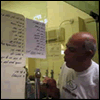As floodwaters recede in most of Baton Rouge, La., residents are returning to abandoned homes to assess the damage, and Chabad-Lubavitch emissaries are doing their part to help.
“People were left with the shirts on their backs last week,” says Rabbi Peretz Kazen, co-director of Chabad of Baton Rouge with his wife, Mushka. “Now they are starting to make their way back to assess the devastation and see what they can salvage.”
Noting that a nourishing meal can often do wonders for the body and soul, Mushka Kazen has been cooking hot kosher dinners for members of the community to eat at home, in addition to inviting people to her own home for dinner.
The couple is also planning a community-wide Shabbat dinner for people to “enjoy the feeling of not being alone, and to express thanks to G‑d for our lives and the goodness we have.”
Meanwhile, the Kazens have been coordinating volunteer efforts to help people move valuables and furniture out of waterlogged homes. They have also been distributing emergency funds to help people with food, clothing and other short-term needs.
The historic flooding that battered Louisiana has left at least 13 dead, with 30,000 people rescued and 40,000 homes damaged throughout the state. In Baton Rouge, only a fraction of homeowners have flood insurance. The American Red Cross called the flooding the country’s worst natural disaster since Hurricane Sandy four years ago.

The flooding in Louisiana has closed government offices, schools, businesses and roadways, leaving uncertainty in some areas about when they will reopen. Authorities have been going house to house checking that residents are accounted for since more than 24 inches of water begin falling last Thursday night.
Mushka Kazen was just a teenager when Hurricane Katrina unleashed its vengeance on Louisiana and flooded her family’s hometown of New Orleans in the last week of August 2005. Back then, she helped her Chabad emissary parents in a massive effort to assist residents as they struggled in the wake of that devastating storm, trying to put their property and lives back together.
In an experience that she describes as “eerily familiar,” she and her husband are now doing much of what her parents did a decade ago.
Click to contribute to Chabad of Baton Rouge’s flood-relief efforts.










Join the Discussion